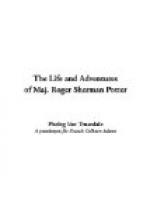celebrated institutions had conferred high honors upon
him. This high throwing of the parson’s
lasso getting abroad atoned for innumerable antiquated
and very dull sermons, for the delivery of which he
would excuse himself to his private friends by saying
that his salary was but four hundred dollars a year,
one third of which he took in No. 2 mackerel no one
would buy of him. He was excessively fussy; and
if he advocated temperance to-day, he would to-morrow
take a sly smash, never forgetting to add that it was
recommended by his physician, who was likewise a man
of great learning. Under the influence of this
medicine, it was said, by malicious people, which
no parish is with—out, that if the occasion
demanded a serious sermon he was sure to preach one
that would send all the young folks of his congregation
into a titter. If the occasion was such as to
tolerate a little humor, he was sure to send them
all into a melancholy mood with the gravity of his
remarks. In fine, he was sure to be on the opposite
side of everything natural. The only question
he was not quite sure it would do to get upon, was
the slavery question. And for this he always excused
himself by saying that there were many others in the
same condition. It would not do to be in the
desert, hence he inclined to the policy of our fashionable
clergy, who are extremely cautious not to steer too
close to questions not popular enough to be profitably
espoused. If Parson Stebbins (for such was his
name) let drop a few words in favor of freedom to-day,
Obadiah Morgan, the most influential member of his
church, would to-morrow politely withdraw. A word
or two complimentary of the South and her peculiar
institutions was equally sure to find him taken to
task by the philanthropic females of his parish.
In truth, he could approach neither side of the question
without finding a fire in his rear. And as his
empty pocket would not allow him to rise to independence,
he resolved to preach to that portion of his church
which was content to let the slavery question take
care of itself.
The parson joined my father in his endeavors to shake
the resolution I had taken, and said many things concerning
the snares set by the wicked world, and how easy it
was for an ardent youth like myself to fall into them,
that grievously annoyed my mother; for, as I have
said before, she had great faith in my virtue, and
so doted on me that she had a ready excuse for all
my follies. Indeed, she would often smile at
the combined alarm of my father and the parson, saying
she held it infinitely better that a youth like myself
go out upon the world in search of distinction, for
therein lay the virtue of his example. Children
were born to the world; if they had daring enough
to go out upon it and battle with it, the parson’s
advice to stay at home was unnecessary. You could
not make human things divine; and, to expect miracles
from saints now-a-days, or truth from critics, or
liberality from parsons, was like looking for reason
in our “current literature.”




